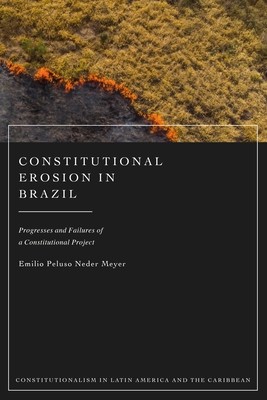
- We will send in 10–14 business days.
- Author: Emilio Peluso Neder Meyer
- Publisher: Hart Publishing
- ISBN-10: 1509950508
- ISBN-13: 9781509950508
- Format: 15.6 x 23.4 x 1.4 cm, softcover
- Language: English
- SAVE -10% with code: EXTRA
Reviews
Description
This book provides a fascinating analysis of a single jurisdiction, Brazil, and accounts for both the successes and the failures of its most recent constitutional project, inaugurated by the Constitution of 1988.
It sets out the following aspects of the constitutional development and erosion:- the different phases of the promised transition from military rule to a 'social-democratic constitutionalism';
- the obstacles to democratisation derived from the absence of true institutional reforms in the judicial branch and in the civil-military relationship;
- the legal and social practices which maintained a structure that obstructed the emergence of an effective social-democracy, such as the neoliberal pattern, the acceptance in the political field of unlawful organisations, such as the milÃcias, and the way the digital revolution has been harming the formation of democratic sovereignty. Situating Brazil in the global context of the revival of authoritarianism, it details the factors which are common to the third wave of democratisation reflux. Accounting for those aspects, particular to the Brazilian jurisdiction, it shows that there is a tension in the Brazilian constitution. On the one hand, such constitutionalism was renewed by democratic pressure on governments to undertake social politics since 1988. On the other hand, it retained authoritarian practices through the hands of diverse institutions and political actors. By exploring the ideas of constitutional erosion and collapse, as well as democratic, social and digital constitutionalism, the book presents a comparative analysis of Brazil and other jurisdictions, including the United States, South Africa, and Peru.
EXTRA 10 % discount with code: EXTRA
The promotion ends in 19d.22:12:45
The discount code is valid when purchasing from 10 €. Discounts do not stack.
- Author: Emilio Peluso Neder Meyer
- Publisher: Hart Publishing
- ISBN-10: 1509950508
- ISBN-13: 9781509950508
- Format: 15.6 x 23.4 x 1.4 cm, softcover
- Language: English English
This book provides a fascinating analysis of a single jurisdiction, Brazil, and accounts for both the successes and the failures of its most recent constitutional project, inaugurated by the Constitution of 1988.
It sets out the following aspects of the constitutional development and erosion:- the different phases of the promised transition from military rule to a 'social-democratic constitutionalism';
- the obstacles to democratisation derived from the absence of true institutional reforms in the judicial branch and in the civil-military relationship;
- the legal and social practices which maintained a structure that obstructed the emergence of an effective social-democracy, such as the neoliberal pattern, the acceptance in the political field of unlawful organisations, such as the milÃcias, and the way the digital revolution has been harming the formation of democratic sovereignty. Situating Brazil in the global context of the revival of authoritarianism, it details the factors which are common to the third wave of democratisation reflux. Accounting for those aspects, particular to the Brazilian jurisdiction, it shows that there is a tension in the Brazilian constitution. On the one hand, such constitutionalism was renewed by democratic pressure on governments to undertake social politics since 1988. On the other hand, it retained authoritarian practices through the hands of diverse institutions and political actors. By exploring the ideas of constitutional erosion and collapse, as well as democratic, social and digital constitutionalism, the book presents a comparative analysis of Brazil and other jurisdictions, including the United States, South Africa, and Peru.


Reviews